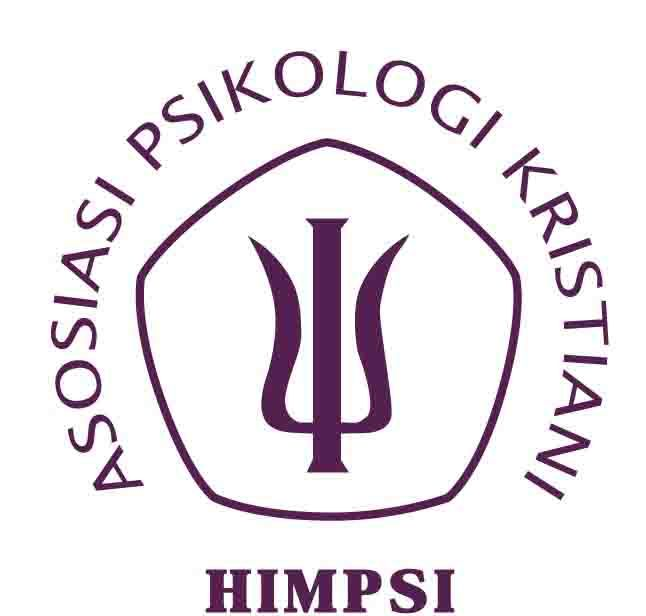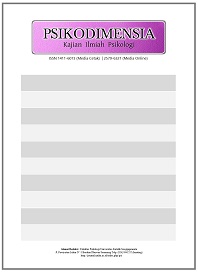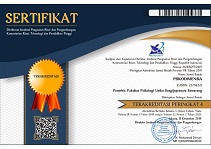The Effectivity of “Beta Pulih” Program to Reduce Negative Emotions of Juvenile Offenders
Abstract
Interventions related to forgiveness have a positive impact on individuals' positive emotions. Forgiveness is important for victims who experience bitterness. There is still little research that discusses forgiveness among juvenile offenders. Juvenile offenders are 'victims' of other offenders, thus causing juvenile offenders have negative emotions towards other people and themselves. The aim of this research is to know effectivity of 'Beta Pulih' program to help juvenile offenders reduce negative emotions. The Beta Pulih program is designed based on Enright's forgiveness process. The design of this research is quasi-experimental with a one group pretest-posttest design. Participants were selected using random sampling from children detention center in Kupang. The number of participants was 16 people. Participants take the program for four sessions. The research results show that the Beta Pulih Program can reduce the negative emotions of juvenile offenders with a value of t = 9,188 and a significance of 0.000, which shows that there is a difference in negative emotions before and after the program is implemented. Juvenile offenders are also aware of the hurt they are experiencing, but find it difficult to express positive emotions in an adaptive way. The implication of this research is to design private sessions with juvenile offenders to help juvenile offenders be able to express positive emotions.
Keywords
Full Text:
PDFReferences
Alberts, H. J. E. M., Schneider, F., & Martijn, C. (2012). Dealing efficiently with emotions: Acceptance-
based coping with negative emotions requires fewer resources than suppression. Cognition and
Emotion, 26(5). https://doi.org/10.1080/02699931.2011.625402
Amiri, F., Moslemifar, M., Showani, E., & Panahi, A. (2020). Effectiveness of forgiveness therapy in
treatment of symptoms of depression, anxiety, and anger among female students with love trauma
syndrome. Journal of Advanced Pharmacy Education & Research, 10(S1).
Ascioglu Onal, A., & Yalcin, I. (2017). Forgiveness of Others and Self?Forgiveness: The Predictive Role
of Cognitive Distortions, Empathy and Rumination. Eurasian Journal of Educational Research, 17(68).
https://doi.org/10.14689/ejer.2017.68.6
Aydın, G., Kandemir Özdinç, N., & Aksu, M. (2015). The relationship between cognitive distortions and
forgiveness in romantic relationships. International Journal of Human Sciences, 12(1).
https://doi.org/10.14687/ijhs.v12i1.3206
Azra, F. N. (2017). Forgiveness dan Subjective Well-Being Dewasa Awal Atas Perceraian Orang Tua
Pada Masa Remaja. Psikoborneo: Jurnal Ilmiah Psikologi, 5(3).
https://doi.org/10.30872/psikoborneo.v5i3.4412
Badan Pembinaan Hukum Nasional (2022).
Badan Pusat Statistik. (2023).
Baskin, T. W., & Enright, R. D. (2004). Intervention Studies on Forgiveness: A Meta-Analysis. In Journal
of Counseling and Development (Vol. 82, Issue 1). https://doi.org/10.1002/j.1556-6678.2004.tb00288.x
Benu, J. M. Y., Manafe, R. P., & Nabuasa, E. (2021). Beta Rasa: Emotion Regulation Program to Reduce
Young Offenders Anxiety in LPKA Kupang. Gadjah Mada Journal of Professional Psychology
(GamaJPP), 7(1), 13. https://doi.org/10.22146/gamajpp.58623
Enright, R. D. (2001). Forgiveness is a choice: A step-by-step process for resolving anger and restoring
hope. Washington DC : American Psychological Association.
Enright, R. D. (2012). The forgiving life: A pathway to overcoming resentment and creating a legacy of
love. In The forgiving life: A pathway to overcoming resentment and creating a legacy of love.
American Psychological Association. http://ovidsp.ovid.com/ovidweb.cgi?
T=JS&PAGE=reference&D=psyc9&NEWS=N&AN=2011-30260-000
Erdyanto, E. F., & Suprapti, V. (2019). Hubungan antara keberfungsian keluarga dengan subjective
well-being pada remaja tunanetra di Surabaya. Jurnal Psikologi Pendidikan Dan Perkembangan, 06.
Ford, B. Q., Lam, P., John, O. P., & Mauss, I. B. (2018). The psychological health benefits of accepting
negative emotions and thoughts: Laboratory, diary, and longitudinal evidence. Journal of Personality
and Social Psychology, 115(6). https://doi.org/10.1037/pspp0000157
Ho, M. Y., & Fung, H. H. (2011). A Dynamic Process Model of Forgiveness: A Cross-Cultural Perspective.
Review of General Psychology, 15(1), 77–84. https://doi.org/10.1037/a0022605
Hurd, N. M., Zimmerman, M. A., & Reischl, T. M. (2011). Role model behavior and youth violence: A
study of positive and negative effects. Journal of Early Adolescence, 31(2), 323–354.
https://doi.org/10.1177/0272431610363160
Kaleta, K., & Mróz, J. (2020). The Relationship between Basic Hope and Depression: Forgiveness as a
Mediator. Psychiatric Quarterly, 91(3), 877–886. https://doi.org/10.1007/s11126-020-09759-w
Lee, Y. R., & Enright, R. D. (2019). A meta-analysis of the association between forgiveness of others
and physical health. Psychology and Health, 34(5). https://doi.org/10.1080/08870446.2018.1554185
Mackey, E. (2015). Forgiveness Therapy in the Relief of Discomfort. Journal of Pain & Relief, 04(03).
https://doi.org/10.4172/2167-0846.1000179
Marcinechová, D., Záhorcová, L., & Lohazerová, K. (2023). Self-forgiveness, Guilt, Shame, and Parental
Stress among Parents of Children with Autism Spectrum Disorder. Current Psychology.
https://doi.org/10.1007/s12144-023-04476-6
Martha, K., & Kurniati, N. M. T. (2018). Efektivitas Terapi Pemaafan Dengan Model Proses Dari Enright
Untuk Membantu Remaja Korban Perceraian Dalam Memaafkan Orang Tua. Jurnal Psikologi, 11(1), 10–
https://doi.org/10.35760/psi.2018.v11i1.2070
Septarianda, E., Malay, M. N., & Ulfah, K. (2020). Hubungan Forgiveness dengan Subjective Well-Being
pada Remaja di Panti Asuhan. Jurnal Psikologi Malahayati, 2(1). https://doi.org/10.33024/jpm.v2i1.2488
Shanti, T. I., & Susanto, B. V. (2020). Hubungan antara Mindfulness dan Dispositional Forgiveness
pada Remaja dengan Orang Tua Bercerai. Indonesian Journal of Guidance and Counseling: Theory and
Application, 9(1).
Thompson, L. Y., Snyder, C. R., Hoffman, L., Michael, S. T., Rasmussen, H. N., Billings, L. S., Heinze, L.,
Neufeld, J. E., Shorey, H. S., Roberts, J. C., & Roberts, D. E. (2005). Dispositionol forgiveness of self,
others, and situations. Journal of Personality, 73(2). https://doi.org/10.1111/j.1467-6494.2005.00311.x
Wijaya, D.A., & Widyorini, E. (2023). Journey of forgiveness: Forgiveness therapy for orphaned
adolescents. Insight : Jurnal Ilmiah Psikologi, 24 (2) : 17 – 27.
Worthington, E. L., & Scherer, M. (2004). Forgiveness is an emotion-focused coping strategy that can
reduce health risks and promote health resilience: Theory, review, and hypotheses. Psychology and
Health, 19(3), 385–405. https://doi.org/10.1080/0887044042000196674
Xie, X., Tang, X., Rapp, H., Tong, D., & Wang, P. (2020). Does forgiveness alleviate depression after
being phubbed for emerging adults? The mediating role of self-esteem. Computers in Human
Behavior, 109. https://doi.org/10.1016/j.chb.2020.106362
Zuanny, I. P., & Subandi. (2015). Forgiveness Therapy To Improve the Meaningfulness of Life.
International Conference on Science, Technology and Humanity, 12, 289–311.
https://ojs.unm.ac.id/PJAHSS/article/viewFile/44189/20714
DOI: https://doi.org/10.24167/psidim.v23i1.11880
Print ISSN : 1411-6073 | online ISSN : 2579-6321 View My Stats

This work is licensed under a Creative Commons Attribution 4.0 International License.





















